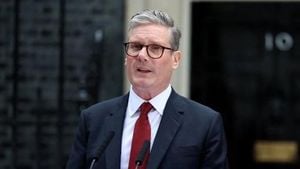When U.S. President Donald Trump touches down in Britain this week, he will be greeted with the full force of British royal pageantry—carriage tours, a state banquet, a military flypast, and even an elaborate gun salute. But behind the dazzling spectacle lies a flurry of high-stakes negotiations and landmark agreements that could reshape the transatlantic relationship for years to come.
According to FRANCE 24 and Reuters, the United States and the United Kingdom are set to unveil a series of major deals on technology and civil nuclear energy during Trump’s unprecedented second state visit, which begins Tuesday, September 16, 2025. The visit marks a significant moment for both nations, as Prime Minister Keir Starmer’s government pushes to finalize lower tariffs on steel and aluminum and deepen economic, security, and cultural ties with Washington.
The British government is betting that the soft power of the monarchy—complete with a royal carriage procession, a formal state banquet attended by King Charles III, and a flypast by military aircraft—will charm the American president and smooth the path for a new era of cooperation. As a spokesperson for Starmer put it, "The UK-US relationship is the strongest in the world. This week we are delivering a step change in that relationship."
Central to this diplomatic blitz is the signing of what Starmer’s team describes as a "world-leading tech partnership" and a "major civil nuclear deal." These agreements are designed not just to showcase unity, but to deliver tangible economic benefits on both sides of the Atlantic. In fact, the UK government has already announced over 1.25 billion pounds ($1.69 billion) in fresh U.S. investment from companies such as PayPal, Bank of America, and others. According to sources cited by FRANCE 24, tech giants Nvidia and OpenAI are expected to unveil new investment deals as part of the technology agreement, while U.S. cloud computing provider CoreWeave will also announce British investments this week.
But it’s the civil nuclear agreement that has drawn particular attention. As reported by Bloomberg, the U.S. and Britain will sign a pact to make it faster for companies in both countries to build nuclear power stations. Under the new deal, each nation will recognize the other’s safety assessments of reactor designs, allowing for fast-tracked licensing checks. This move is expected to cut the licensing time for nuclear projects from three or four years down to just two, a change the UK government says will accelerate the roll-out of new nuclear capacity on both sides of the Atlantic.
Starmer and Trump are scheduled to meet Thursday, September 18, at the Prime Minister’s Chequers country residence for in-depth talks. The agenda includes not only the formal signing of the tech and nuclear agreements, but also discussions about working more closely on global security issues, particularly Ukraine. The two leaders are expected to focus on finalizing the promised lower tariffs on steel and aluminum, a long-standing goal for British manufacturers eager for better access to the U.S. market.
Progress on tariffs has been incremental. While the United States agreed in June to reduce tariffs on car imports, the details for steel and aluminum are still being hammered out. British business minister Peter Kyle told the BBC on Sunday, September 14, "When it comes to steel, we will make sure that we have an announcement as soon as possible." For Starmer, who was the first world leader to clinch an economic deal with Trump on global tariff reductions, sealing the deal on metals would be a signature achievement.
The diplomatic choreography isn’t just about economics and defense. British and American officials plan to announce new initiatives to deepen cultural ties, including a push to promote basketball in Britain and develop partnerships between heritage and art institutions. These softer elements of the agenda underscore a broader effort to bind the two nations together—not just through trade and security, but through shared culture and values.
Yet, the backdrop to this week’s summit isn’t without its complications. Just days before Trump’s arrival, Starmer dismissed Peter Mandelson, his ambassador to the United States, over ties to the late convicted U.S. sex offender Jeffrey Epstein. The abrupt firing, less than a year after Mandelson’s appointment, has been described by FRANCE 24 as "deeply embarrassing" for Starmer. British officials acknowledge that the episode could complicate sensitive negotiations in Washington, where a delegation is currently finalizing the details of Trump’s visit.
This will be Trump’s second visit to Britain in as many months, following a trip to his Scottish golf courses at the end of July. The frequency of these visits—unprecedented for a sitting U.S. president—reflects both the importance of the UK-US relationship and the personal rapport that has developed between Trump and Starmer. Despite their different political backgrounds—Starmer, a technocrat and self-proclaimed socialist, and Trump, a proudly unpredictable figure who has pushed the Republican Party further to the right—the two leaders have managed to forge a productive working relationship.
For Starmer, the stakes are high. His government is eager to demonstrate that Britain can attract major international investment and secure favorable trade terms post-Brexit. The announcement of more than 1.25 billion pounds in U.S. investment, along with the promise of further deals from leading American tech firms, is intended to send a clear message: Britain remains a premier destination for global business.
For Trump, the visit offers a chance to showcase American leadership on the world stage and to reinforce the enduring alliance with Britain—a relationship often described as "special" but, in reality, subject to the shifting winds of global politics and economics. The agreements on technology and nuclear energy, along with progress on tariffs, are likely to be touted as evidence of Trump’s ability to deliver for American industry and workers.
Amid the pomp and circumstance, the real work will be happening behind closed doors. Negotiators from both countries are racing to finalize the text of the new agreements and to iron out the remaining details on tariffs. The hope, according to Starmer’s spokesperson, is that this week’s summit will mark "a step change" in the UK-US relationship—a phrase that captures both the ambition and the urgency of the moment.
As the gun salute echoes across London and the royal procession winds its way through the city, the world will be watching to see whether the pageantry can indeed pave the way for progress. With billions in investment, new technology and nuclear partnerships, and the promise of deeper cultural ties on the table, both sides have a lot riding on the outcome. One thing’s for sure: the special relationship is about to get a major update.




